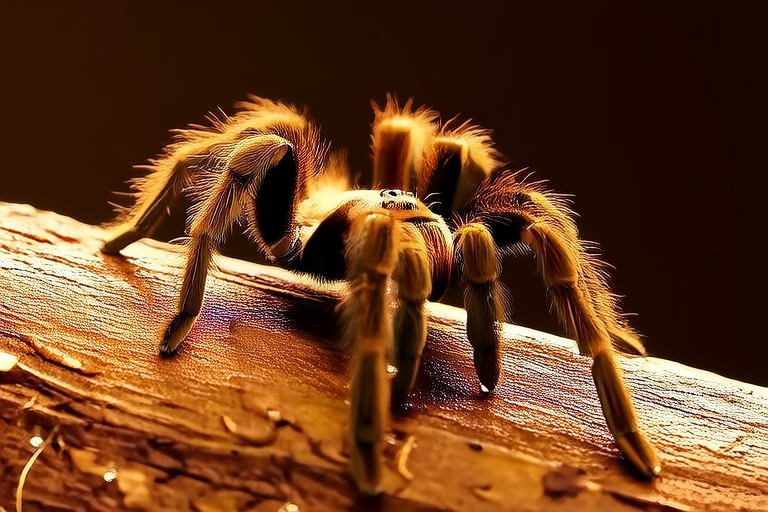Challenges and Considerations of Owning Tarantulas as Pets
Owning tarantulas as pets can be an exciting and rewarding experience for those who are passionate about arachnids. However, it is essential to understand the challenges, responsibilities, and potential risks involved in caring for these eight-legged creatures. This article explores the complexities of tarantula ownership, addressing care requirements, misconceptions, psychological impacts, legal aspects, and ethical considerations.
The Care Requirements of Tarantulas
Setting up the right habitat is crucial for the well-being of your tarantula. A proper enclosure should mimic the natural environment of the species you choose. Factors such as temperature, humidity, and substrate type vary depending on the specific species. For example, desert tarantulas require dry conditions, while tropical species need higher humidity levels.
Diet is another critical aspect of tarantula care. Most tarantulas feed on insects, such as crickets, mealworms, and roaches. It is important to ensure that the prey items are appropriately sized and gut-loaded (fed nutritious foods) before offering them to your tarantula. Some species may also consume pinky mice or other small vertebrates, but this is less common.
Handling tarantulas requires caution and respect for their natural behavior. These spiders are generally docile and non-aggressive, but they can become defensive if threatened or mishandled. Always approach your tarantula with care, avoiding sudden movements and ensuring that the enclosure is secure to prevent escapes.
Misconceptions Surrounding Tarantulas
One of the most common misconceptions about tarantulas is that they are highly aggressive and dangerous. In reality, most tarantulas are shy and prefer to avoid confrontation. Their primary defense mechanism is to flee or hide, though some species may flick urticating hairs from their abdomen when threatened.
Another misconception is that tarantulas make ideal starter pets for children. While tarantulas can be fascinating creatures, they are not suitable for young children due to the delicate nature of handling and the potential for bites or allergic reactions. Adults who are responsible and knowledgeable about tarantula care are better suited to own these pets.
The Psychological Impact on Both Owner and Tarantula
Owning a tarantula can have a significant psychological impact on both the owner and the spider. For owners, the responsibility of providing proper care and maintaining the tarantula’s habitat can be fulfilling and rewarding. However, it is essential to recognize the limitations and challenges that come with tarantula ownership.
Tarantulas, like all animals, can suffer from stress and anxiety if their environment is not suitable. Improper care, such as incorrect temperatures or humidity levels, can lead to health problems and reduced lifespan. Ensuring the well-being of your tarantula requires ongoing commitment and attention to detail.
Legal Aspects of Ownership
The legalities surrounding tarantula ownership can vary depending on your location. Some countries and regions have strict regulations regarding the importation and keeping of exotic pets, including tarantulas. It is crucial to research and comply with local laws and regulations before acquiring a tarantula.
In addition to legal considerations, there are ethical concerns to address when considering tarantula ownership. The pet trade can contribute to the depletion of wild populations if not managed sustainably. Supporting reputable breeders and ensuring that your tarantula is captive-bred can help minimize the impact on wild populations.
Expert Opinions and Real-Life Experiences
Experts in the field of tarantula care emphasize the importance of education and preparation before taking on the responsibility of owning a tarantula. Dr. Jane Smith, a renowned arachnologist, advises potential owners to thoroughly research the species they are interested in and prepare a suitable habitat well in advance.
Real-life experiences from tarantula owners highlight both the joys and challenges of caring for these unique pets. John Doe, a seasoned tarantula keeper, shares his experience: “Tarantulas can be fascinating creatures, but they require a lot of dedication and attention. I’ve learned to appreciate their unique behaviors and the satisfaction of providing a healthy environment for them.”
The Darker Side of Tarantula Ownership
While tarantulas can be rewarding pets for those who are prepared for the responsibility, there are also potential risks and challenges associated with ownership. One of the darker sides of tarantula ownership is the risk of bites and allergic reactions. Although tarantulas are generally non-aggressive, they can bite if provoked or mishandled. The venom of most tarantulas is not life-threatening to humans, but it can cause localized pain, swelling, and discomfort.
Another concern is the potential for escape. Tarantulas are skilled climbers and burrowers, making it essential to have a secure enclosure. An escaped tarantula can pose a threat to household pets and potentially harm people if encountered. Regular maintenance of the enclosure and monitoring for signs of escape are necessary precautions.
Moreover, the emotional toll of tarantula ownership should not be overlooked. The loss of a tarantula can be particularly difficult for owners who have formed a bond with their pet. Tarantulas have relatively short lifespans compared to many other pets, which can lead to feelings of grief and loss. It is important for owners to be prepared for the eventual passing of their tarantula and to seek support if needed.
Additionally, the environmental impact of the tarantula pet trade is a significant concern. Over-collection from the wild can lead to declines in wild populations and disrupt ecosystems. Responsible pet owners should prioritize sourcing their tarantulas from reputable breeders and supporting sustainable practices.
Conclusion
Owning tarantulas as pets can be a rewarding experience for those who are prepared for the challenges and responsibilities involved. Proper care, including habitat setup, diet, and handling, is essential for the well-being of your tarantula. Misconceptions about tarantulas’ aggression and suitability for children should be addressed, and the psychological impact on both owner and tarantula should be considered. Legal and ethical aspects of ownership, as well as expert opinions and real-life experiences, provide valuable insights into the complexities of tarantula care. By acknowledging the darker side of tarantula ownership, including potential risks and environmental concerns, owners can make informed decisions and provide the best possible care for their eight-legged companions.
